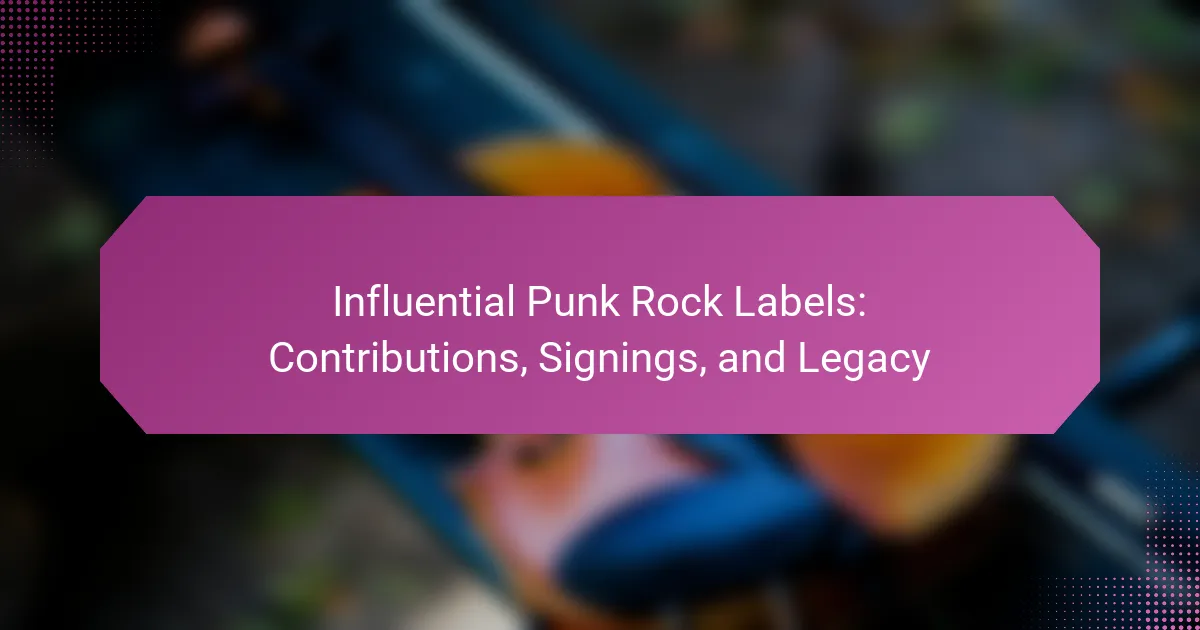Influential punk rock labels have played a crucial role in shaping the genre through their groundbreaking signings and cultural impact. This article explores the contributions of key labels like SST Records and Epitaph Records, highlights significant band signings such as The Ramones and Green Day, and examines their lasting legacy in the music industry. Additionally, it discusses the best practices these labels employ in artist development and community engagement.

What are the key contributions of influential punk rock labels?
Influential punk rock labels significantly shaped the genre through groundbreaking signings and cultural impact. Labels like SST Records, Dischord Records, and Epitaph Records championed emerging artists, fostering a DIY ethos. SST Records launched the careers of bands like Black Flag and Sonic Youth, while Dischord promoted the Washington D.C. scene, featuring bands like Minor Threat. Epitaph introduced punk to mainstream audiences with The Offspring and Rancid. These labels not only provided a platform for diverse voices but also established a lasting legacy that influenced countless musicians and genres.
How have these labels shaped the punk rock genre?
Influential punk rock labels have significantly shaped the genre by promoting diverse sounds, fostering community, and launching iconic bands. Labels like SST Records and Dischord Records have been pivotal in defining punk’s ethos and aesthetic. Their contributions include innovative marketing strategies and support for underground artists. For instance, SST’s signings of bands like Black Flag and Sonic Youth introduced raw, experimental sounds that expanded punk’s boundaries. The legacy of these labels continues to influence new generations, maintaining punk’s rebellious spirit and cultural relevance.
What role do punk rock labels play in artist development?
Punk rock labels play a crucial role in artist development by providing resources, guidance, and exposure. They help shape an artist’s sound, brand, and audience reach. Labels like Epitaph and Fat Wreck Chords have a history of nurturing talent through strategic signings and marketing efforts. These labels often foster a community that supports emerging artists, ensuring their growth within the punk rock scene. Additionally, their legacy includes influencing musical trends and promoting DIY ethics, which are foundational to punk culture.
Which influential punk rock labels emerged in the 1970s and 1980s?
Influential punk rock labels that emerged in the 1970s and 1980s include SST Records, Dischord Records, and Epitaph Records. These labels significantly shaped the punk rock scene by promoting diverse artists and fostering a DIY ethic. SST Records, founded by Greg Ginn, signed notable bands like Black Flag and Sonic Youth. Dischord Records, established by Ian MacKaye, was pivotal in the Washington D.C. punk scene, featuring bands such as Minor Threat and Fugazi. Epitaph Records, created by Bad Religion’s Brett Gurewitz, launched the careers of bands like The Offspring and Rancid, contributing to punk’s mainstream success.
How do regional punk rock labels differ in their contributions?
Regional punk rock labels contribute uniquely by fostering local scenes, promoting diverse sounds, and supporting grassroots movements. They often sign emerging artists who reflect regional identities. This localized focus contrasts with major labels that prioritize commercial success. For instance, labels like Fat Wreck Chords and Epitaph have shaped the punk genre while maintaining ties to their roots. Their legacy includes nurturing subcultures and influencing music trends.

Who are the most significant signings from punk rock labels?
The most significant signings from influential punk rock labels include bands like The Ramones, Green Day, and Bad Religion. These bands shaped the punk genre and left a lasting legacy.
The Ramones, signed to Sire Records, are often credited with popularizing punk rock in the 1970s. Their fast-paced sound and distinctive style influenced countless musicians. Green Day, a key signing for Reprise Records, brought punk to mainstream audiences in the 1990s with their album “Dookie.” Bad Religion, under Epitaph Records, is known for their thought-provoking lyrics and has been pivotal in the punk scene since the 1980s.
Other notable signings include The Offspring and Rancid, both of which contributed significantly to the punk revival in the 1990s. Each of these bands exemplifies the unique attributes that punk rock labels have fostered, ensuring the genre’s evolution and relevance.
What impact have these artists had on the punk rock scene?
Influential punk rock labels have significantly shaped the genre through their artist signings and cultural impact. Labels like SST Records and Dischord Records pioneered the DIY ethic, fostering a community of independent artists. SST, for example, launched the careers of bands like Black Flag and Sonic Youth, establishing a raw sound that defined punk’s evolution. Dischord, home to Fugazi and Minor Threat, emphasized political messages and ethical practices, promoting a unique punk ideology. Their legacies continue to influence new generations, highlighting the importance of independent music in shaping cultural movements.
Which punk rock labels are known for discovering breakthrough talent?
Notable punk rock labels known for discovering breakthrough talent include Epitaph Records, Fat Wreck Chords, and Dischord Records. Epitaph, founded by Bad Religion’s Brett Gurewitz, has launched bands like The Offspring and Rancid. Fat Wreck Chords, created by NOFX’s Fat Mike, has been pivotal for bands such as Lagwagon and Propagandhi. Dischord Records, co-founded by Ian MacKaye of Minor Threat, has been influential in promoting bands like Fugazi and Q And Not U. Each label’s commitment to underground music has significantly shaped the punk rock landscape.
How do signings reflect the evolving sound of punk rock?
Signings reflect the evolving sound of punk rock by introducing diverse styles and influences. Influential labels like Epitaph and Fat Wreck Chords have signed bands that incorporate elements from other genres, such as pop and metal. This diversification leads to a broader sonic palette, showcasing punk’s adaptability. For instance, bands like Rise Against and NOFX have expanded punk rock’s boundaries while maintaining its core ethos. The legacy of these signings illustrates punk’s continual evolution, responding to cultural shifts and audience demands.

What is the legacy of influential punk rock labels?
Influential punk rock labels significantly shaped the music industry and culture. They introduced groundbreaking artists, fostered unique sounds, and promoted anti-establishment messages. Labels like SST Records and Dischord Records were pivotal, signing iconic bands such as Black Flag and Minor Threat. Their contributions include establishing DIY ethics and community-driven approaches, which influenced countless musicians. The legacy of these labels endures, inspiring new generations to embrace punk’s rebellious spirit and creativity.
How have these labels influenced contemporary music genres?
Influential punk rock labels have significantly shaped contemporary music genres by promoting diverse sounds and fostering artistic freedom. Labels like SST Records and Dischord Records have been pivotal in introducing bands that blend punk with other genres. For instance, SST’s signings, such as Hüsker Dü and Sonic Youth, helped merge punk with alternative rock, influencing a generation of musicians. Dischord’s emphasis on DIY ethics encouraged bands to explore unique styles, leading to the emergence of post-hardcore and emo. These labels not only signed groundbreaking artists but also established a legacy of independence and innovation that continues to inspire today’s music landscape.
What are the lasting cultural impacts of punk rock labels?
Punk rock labels have profoundly shaped music culture through their unique contributions and legacies. These labels fostered a sense of community and identity among fans, promoting DIY ethics and independent artistry. For instance, labels like SST Records and Dischord Records signed influential bands that defined the genre, such as Black Flag and Minor Threat. Their commitment to artistic freedom and anti-commercialism inspired countless musicians and movements.
The legacy of punk rock labels is evident in their impact on future genres, encouraging a spirit of rebellion and innovation. They established platforms for marginalized voices, promoting diversity in music. Additionally, the ethos of punk continues to influence contemporary artists, who draw on its principles of authenticity and resistance against mainstream norms. This lasting cultural impact highlights the importance of punk rock labels in shaping not only music but also broader social movements.
Which punk rock labels continue to thrive in the modern music industry?
Several punk rock labels continue to thrive in the modern music industry, including Epitaph Records, Fat Wreck Chords, and Rise Records. Epitaph Records has a legacy of influential signings, such as The Offspring and Rancid, while Fat Wreck Chords is known for its commitment to DIY ethics and artists like NOFX. Rise Records has successfully adapted to the digital age, promoting bands like Pierce the Veil and Sleeping with Sirens. These labels maintain relevance by embracing new trends and fostering a strong community around punk rock music.

How do punk rock labels navigate challenges in the music industry?
Punk rock labels navigate challenges by adapting to industry shifts while maintaining their core values. They focus on artist development, innovative marketing strategies, and building community connections. Labels like Epitaph and Fat Wreck Chords exemplify resilience through diverse signings and a commitment to punk ethos. Their legacy includes fostering underground movements and influencing mainstream music trends.
What strategies do labels use to promote their artists?
Labels promote their artists through strategic marketing, branding, and community engagement. They leverage social media platforms to reach broader audiences and create viral content. Collaborations with popular musicians enhance visibility and credibility. Additionally, labels organize tours and events to connect artists directly with fans. They utilize press coverage and music videos to showcase talent and build a strong narrative around the artist’s brand. Influential punk rock labels, like Epitaph and Fat Wreck Chords, often emphasize authenticity and grassroots support, fostering a loyal fanbase.
How do punk rock labels adapt to changes in music consumption?
Punk rock labels adapt to changes in music consumption by embracing digital platforms and direct artist engagement. They leverage streaming services to distribute music and utilize social media for marketing. Labels like Epitaph and Fat Wreck Chords have shifted focus towards online sales and merchandise to sustain revenue. Additionally, they support artists in building their brands through direct fan interactions, enhancing loyalty and engagement. This adaptability ensures their relevance in an evolving music landscape.
What common pitfalls do punk rock labels face?
Punk rock labels often face challenges such as financial instability, difficulty in artist retention, and market saturation. These pitfalls can hinder their growth and impact.
Financial instability arises from the unpredictable nature of music sales and streaming revenue. As a result, many labels struggle to maintain consistent cash flow, which affects their ability to invest in new talent.
Artist retention is another significant challenge. Punk rock artists often seek creative freedom, leading to frequent label changes. This turnover can disrupt label branding and diminish long-term relationships.
Market saturation complicates the landscape for punk rock labels. With numerous independent labels emerging, standing out becomes increasingly difficult. Labels must innovate to capture audience attention and sustain their legacy.

What best practices can be learned from influential punk rock labels?
Influential punk rock labels teach best practices in artist development, branding, and community engagement. They prioritize authenticity, fostering strong relationships with artists while promoting a distinct identity. Labels like SST and Dischord emphasize DIY ethics, encouraging creativity and independence. Their legacy includes cultivating loyal fan bases through grassroots marketing and live events, demonstrating the power of direct engagement. These practices highlight the importance of cultural relevance and adaptability in the music industry.
How can new labels apply lessons from established punk rock entities?
New labels can learn from established punk rock entities by adopting their strategies for artist development and community engagement. Influential labels like Fat Wreck Chords and Epitaph have built strong identities through consistent branding and artist support. They prioritize nurturing talent, which results in long-lasting relationships and a loyal fan base. New labels should focus on cultivating a unique sound and ethos, ensuring they resonate with the punk rock community. By leveraging social media and grassroots marketing, they can effectively reach and engage audiences.
What are the key factors for success in the punk rock label landscape?
Key factors for success in the punk rock label landscape include strong artist relationships, innovative marketing strategies, and a commitment to authenticity. Labels like Epitaph and Fat Wreck Chords have thrived by fostering community and supporting diverse punk voices. Effective distribution channels and a keen understanding of audience engagement also contribute to their lasting impact. Additionally, adaptability to changing music trends ensures relevance in a competitive industry.



